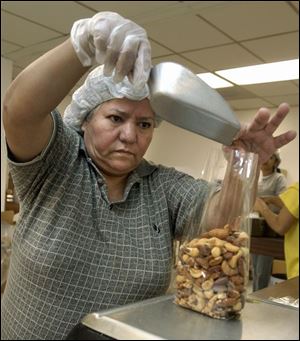
Companies take wraps off strict gift curbs
12/18/2001
At Bassett Nut Co. in Toledo, Yolanda Gama measures a bag of mixed nuts.
Sales representatives and vendors who send pricey gifts to contacts at other companies are likely to end up with coal in their Christmas stockings.
Concerned about keeping employees impartial, many companies this year have adopted strict limits on the size of Christmas gifts that can be accepted.
Only items of “nominal” worth are allowed by 41 percent of firms surveyed by the private Bureau of National Affairs, Inc.
An additional 19 percent prohibit such gifts entirely, according to the research firm.
Executives aren't interested in playing Scrooge, employment policy experts say.
“It's an effort on the part of companies to keep business on the up and up and to keep away from undo influence,” said Jack Hollister, president of the local Employers' Association.
Policies sprang up partly as a result of abuses that went on frequently until the 1970s. Gift-giving, especially to officials of large corporations, was commonplace and sometimes lavish. In some instances executives accepted autos and even cottages from suppliers and vendors, Mr. Hollister said.
“It was wide open,” he added. “December was a tremendous time. It was time to make hay for some of these folks. People realized that was not really an appropriate way to do business.”
Changes in societal mores also have affected gift-giving practices, according to experts. The salesman brandishing fifths of whiskey for everyone in the office is largely a thing of the past.
Still, gifts of liquor haven't disappeared entirely, said Beth Davies, a spokesman for the Distilled Sprits Council. Pricey cognacs and special blends of Scotch are sometimes exchanged in places like New York's financial district, she added.
The trend toward less lavish gifts has benefited firms like metro Toledo's Bassett Nut Co., which ships tens of thousands of tins of nuts and other items to offices nationwide every Christmas, said Vice President Larry Robbins.
At prices starting at $12, the gifts are compatible with all but the strictest company gift policies, he noted. Their popularity also stems from that they are less a personal item and more something that can be enjoyed by everyone in the office, Mr. Robbins said.
The Andersons, a grain, retailing, and fertilizer concern in Maumee, is now developing a company-wide policy to cover its more than 1,300 employees. “We're struggling with what is proper,” said Chuck Gallagher, vice president for human resources.
Some situations are easy to call: accepting lunch, for example, generally wouldn't be a problem. Accepting a trip to the Bahamas would. Up to now, the company has had an informal policy.
In the grocery industry, potential for abuse is significant because of the competition among vendors for shelf space, conceded Pat Nowak, spokesman for local Food Town stores.
The policy in place at parent firm Spartan Stores, Inc. states that “no products or money are to be accepted from vendors, drivers, or manufacturers,” Ms. Nowak said.
Employees of WTVG-TV in Toledo follow the policy of their parent firm, Walt Disney Co.: an employee can accept only one gift a year from a customer or vendor, and the value can't exceed $75.
“In no event can an employee accept cash,” said Barb Vaughn, finance director.
Gifts that exceed the limit must be returned to the giver or sent to company headquarters for donation to a charity, she added.
Even mail carriers have limits on what they can accept, according to Craig Cummings, a customer relations coordinator in Toledo for the U.S. Postal Service. Cash and gift certificates are forbidden under federal regulations.
Carriers are permitted to accept gifts of “small intrinsic value,” which is defined as items worth $20 or less.
That would include things like a tin of cookies, a scarf, or a coffee mug, Mr. Cummings added.
Policies varied widely at the 448 employers surveyed by the Bureau of National Affairs. Monetary limits - usually $25 to $50 - were placed on gifts at 16 percent of firms.
Some companies required that gifts from customers be shared with co-workers, others limited gifts to food items, and a few conducted a raffle among employees.